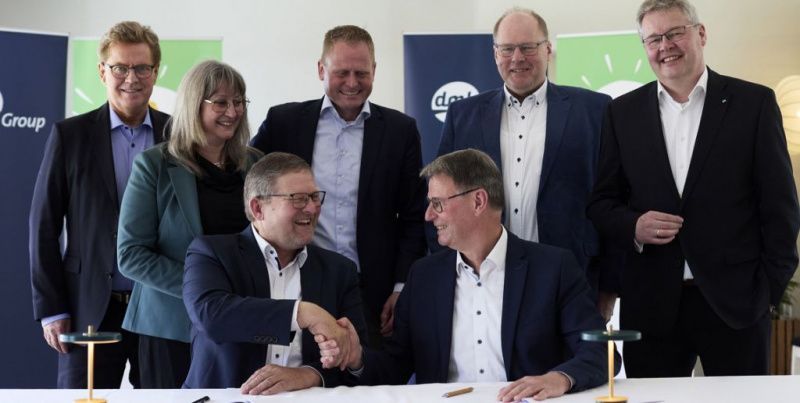Arla Foods, DMK Group Announce Merger Plans to Create Europe’s Largest Dairy Cooperative
Arla Foods and Germany’s DMK Group on Tuesday announced plans to merge, aiming to form Europe’s largest dairy cooperative in a move that would reshape the region’s dairy landscape and strengthen the combined entity’s global competitiveness.

The proposed merger, which remains subject to regulatory and internal approvals, would unite over 12,000 cooperative farmers across northern Europe, generating a combined pro forma annual revenue of €19 billion. The merged entity would be headquartered in Viby J, Denmark, under the Arla name, with Arla’s Chair Jan Toft Nørgaard and CEO Peder Tuborgh retaining their roles. DMK’s CEO Ingo Müller is expected to join the Arla executive management team as Executive Vice President of post-merger integration.
“This merger is a win-win for our cooperatives,” Nørgaard said. “With shared values and complementary strengths, we’re building a resilient and future-focused cooperative that can lead the dairy industry in quality, innovation, and sustainability.”
The two farmer-owned cooperatives have collaborated previously, notably through the ArNoCo joint venture, which processes whey from DMK's cheese production into high-quality dairy ingredients for Arla’s global business. The success of that partnership laid the groundwork for deeper integration.
Consolidation Amid Headwinds
The move comes amid mounting pressures on the European dairy sector, including market volatility, regulatory challenges, and a projected decline in the EU milk pool. Analysts see the consolidation as a strategic attempt to gain scale and efficiency in an increasingly competitive global dairy market.
“This proposed merger marks a significant step toward consolidation in the European dairy sector,” said a senior industry analyst. “Arla and DMK are responding to structural headwinds with a bold bid to future-proof their operations.”
Arla currently processes 13.7 billion kilograms of milk annually, while DMK handles around 5.3 billion kilograms. Together, they would process nearly 19 billion kilograms of milk per year and employ close to 29,000 people across Europe and beyond.
Farmer-Centric Future
Both parties emphasized that the combined cooperative will prioritize farmer returns and value creation. “This partnership strengthens the resilience of our cooperatives and improves our offering for both farmers and customers,” said Heinz Korte, Chair of DMK Group. “Together, we can expand our reach and accelerate innovation.”
The merged entity plans to leverage Arla’s global presence and brand strength—including labels such as Arla®, Lurpak®, and Castello®—alongside DMK’s product diversity, which includes MILRAM, Oldenburger, Humana, and vegan alternatives. The companies cited improved access to international markets and diversified product portfolios as key drivers of long-term growth.
Approval Process Underway
A detailed merger proposal will be shared with cooperative members and employee representatives in the coming weeks. The final agreement is slated for a vote by both cooperatives' Boards of Representatives on June 17–18, 2025. Regulatory approvals are expected by the end of the year.
If approved, the merger will mark one of the most significant restructurings in European agri-food history, potentially setting a new benchmark for cross-border cooperative integration.
“This is about building a home for farmers—now and for future generations,” said Müller. “Together, we will lead in innovation, sustainability, and global dairy leadership.”
“This merger is a win-win for our cooperatives,” Nørgaard said. “With shared values and complementary strengths, we’re building a resilient and future-focused cooperative that can lead the dairy industry in quality, innovation, and sustainability.”
The two farmer-owned cooperatives have collaborated previously, notably through the ArNoCo joint venture, which processes whey from DMK's cheese production into high-quality dairy ingredients for Arla’s global business. The success of that partnership laid the groundwork for deeper integration.
Consolidation Amid Headwinds
The move comes amid mounting pressures on the European dairy sector, including market volatility, regulatory challenges, and a projected decline in the EU milk pool. Analysts see the consolidation as a strategic attempt to gain scale and efficiency in an increasingly competitive global dairy market.
“This proposed merger marks a significant step toward consolidation in the European dairy sector,” said a senior industry analyst. “Arla and DMK are responding to structural headwinds with a bold bid to future-proof their operations.”
Arla currently processes 13.7 billion kilograms of milk annually, while DMK handles around 5.3 billion kilograms. Together, they would process nearly 19 billion kilograms of milk per year and employ close to 29,000 people across Europe and beyond.
Farmer-Centric Future
Both parties emphasized that the combined cooperative will prioritize farmer returns and value creation. “This partnership strengthens the resilience of our cooperatives and improves our offering for both farmers and customers,” said Heinz Korte, Chair of DMK Group. “Together, we can expand our reach and accelerate innovation.”
The merged entity plans to leverage Arla’s global presence and brand strength—including labels such as Arla®, Lurpak®, and Castello®—alongside DMK’s product diversity, which includes MILRAM, Oldenburger, Humana, and vegan alternatives. The companies cited improved access to international markets and diversified product portfolios as key drivers of long-term growth.
Approval Process Underway
A detailed merger proposal will be shared with cooperative members and employee representatives in the coming weeks. The final agreement is slated for a vote by both cooperatives' Boards of Representatives on June 17–18, 2025. Regulatory approvals are expected by the end of the year.
If approved, the merger will mark one of the most significant restructurings in European agri-food history, potentially setting a new benchmark for cross-border cooperative integration.
“This is about building a home for farmers—now and for future generations,” said Müller. “Together, we will lead in innovation, sustainability, and global dairy leadership.”
Key News of the Week










